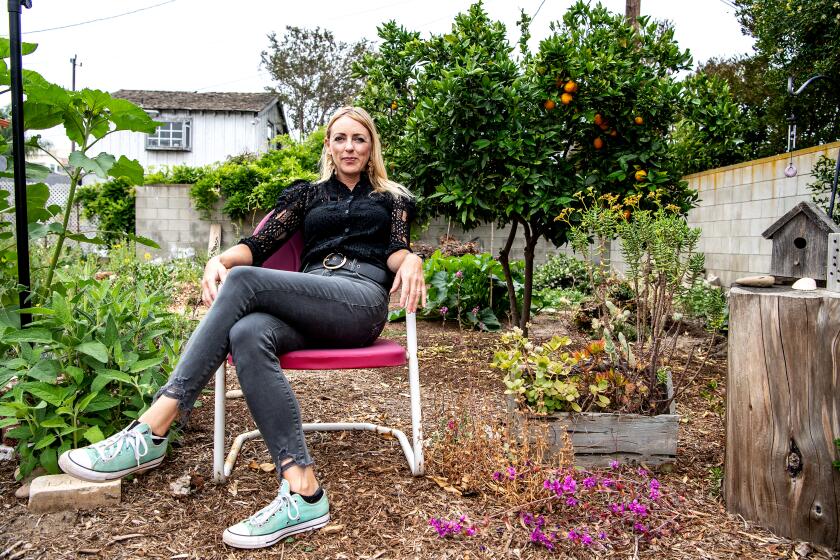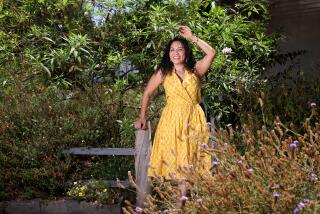Savor native plant-based beer, pizza and ice cream this weekend

- Share via
June is prime time to plant the native milkweeds and nectar flowers that western monarch butterflies need to flourish in Southern California.
And a good place to start your pollinator prep is at the Theodore Payne Foundation’s second Pollination Party on Sunday, June 12, featuring native-plant-infused beer, pizza and ice cream as well as a selection of pollinator plants for purchase at Eagle Rock Brewery, 3056 Roswell St., in Glassell Park from 1 to 5 p.m.
“I like to think of pollination as a two-part thing,” said Evan Meyer, executive director of the Theodore Payne Foundation, “the literal pollination of plants but also the cross-pollination of different groups and cultures in Los Angeles. We want to celebrate summer time, where we live and what’s so cool about being here.”
And one super cool part of being here is access to the third release of Eagle Rock Brewery’s popular Local Source beer, a lager infused with three plants native to Southern California — woolly bluecurls, black sage and California bay laurel. The tap lager sold out at last year’s Pollination Party, Meyer said, so they’ve made sure to have plenty in stock this year, both on tap and in cans.
Sarah Lariviere tore out her lawn and paid for a low-water replacement with a turf removal rebate. Here’s how she made it happen.
Three other pop-up food makers will join the party with native-plant-infused treats: Sad Girl Creamery, a Latina-owned L.A. creamery, is making ice cream; Quarantine Pizza is adding native flavors to its sourdough crusts;and food designers/caterers Hank and Bean will be demonstrating how to make simple dishes using native plants.
All the plants are provided by Theodore Payne, which sent a selection of native stems and leaves to the food makers for inspiration, Meyer said.
“This flora is so aromatic and its smells are so familiar and unusual, it really makes sense for people who are into flavors to utilize them,” Meyer said. “Everybody likes pizza and ice cream, and using native flavors opens up a whole conversation about that. It’s a good gateway to learn more about native plants.”
People also can learn about native plants the old-fashioned way, by browsing the foundation’s pop-up store at the brewery, and its information booth, which will be manned by Meyer himself.
The store will sell a variety of merchandise, from T-shirts and books to several kinds of plants in 4-inch pots, including narrow leaf milkweed, common yarrow, red-flowered buckwheat, Great Valley gumweed, Allen Chickering sage and foothill penstemon. Prices range from $5 to $7 or $20 for a mix-and-match four-pack.
Even California native plants can dry out in the summer. But these varieties will still look good in Los Angeles yards and gardens during the hottest months.
Meyer said the event is family-friendly, with nonalcoholic beverages including his recipe for lemonade infused with black sage, “one of the most common plants that grow in the wild areas of L.A.” Here’s how he makes it:
- Stir together equal parts of water and sugar (as in one cup sugar and one cup water) and then dissolve it over heat to make a simple syrup.
- You don’t want to boil this solution; just warm it until the sugar dissolves, he said, and then take it off the heat and add 4 or 5 leaves of black sage. Don’t leave the leaves in very long — about 5 minutes should be enough — because the sage flavors are potent.
- Remove the leaves and add fresh-squeezed lemon juice mixed with water until you have the lemony taste you want. (Meyer recommends using filtered water to improve the taste.)
The flavor will be a little raspy, “but in a good way,” Meyer said. “If you do it right, balance the sugar and lemon, it’s not tea-like but more botanical, and man, it’s good. It’s the taste of L.A.”
More to Read
Sign up for The Wild
We’ll help you find the best places to hike, bike and run, as well as the perfect silent spots for meditation and yoga.
You may occasionally receive promotional content from the Los Angeles Times.













